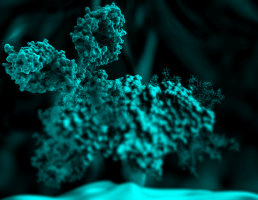
In several types of cancer, elevated expression of the chemokine receptor CCR4 in tumours is associated with poor patient outcomes.
Communication through CCR4 may be one mechanism that cancer cells use to create a pro-tumour environment that protects tumours from immune system attacks.
Antibodies that block CCR4 are currently in clinical trials for treating blood and lymphatic cancers, but these approaches may also effectively target cancers that produce solid tumours.
In this issue of the JCI, a study led by Frances Balkwill at Barts Cancer Institute evaluated whether blocking CCR4 in a mouse model of cancer could counteract the signalling that creates a pro-tumour environment.
In mice with renal cell carcinoma, antibody-mediated inhibition of CCR4 changed the composition of immune cell populations that were present in the tumour microenvironment.
The changes were associated with reduced tumour proliferation, suggesting that inhibition of CCR4 had anti-tumour effects.
These results highlight anti-CCR4 antibodies as a potential therapeutic for multiple cancers that are linked to abnormal CCR4 expression, including ovarian cancer, breast cancer, and glioblastoma.
Source: JCI Journals
We are an independent charity and are not backed by a large company or society. We raise every penny ourselves to improve the standards of cancer care through education. You can help us continue our work to address inequalities in cancer care by making a donation.
Any donation, however small, contributes directly towards the costs of creating and sharing free oncology education.
Together we can get better outcomes for patients by tackling global inequalities in access to the results of cancer research.
Thank you for your support.